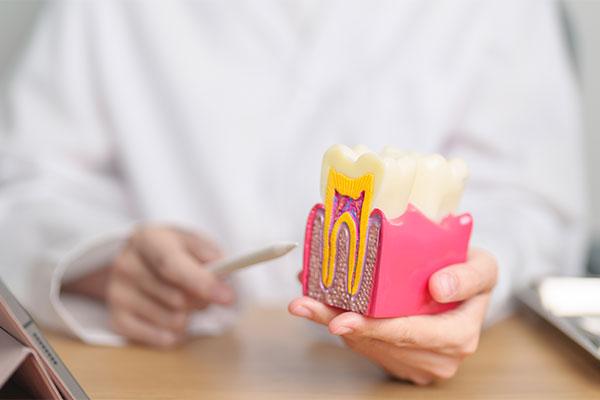Is There a Recovery Period After Getting Dental Crowns?

Patients considering dental crowns may have concerns regarding the recovery period following the procedure. Fortunately, the typical recovery period is relatively quick and involves minor inconvenience. Most risks and complications resulting from the procedure are comparable to those of most dental procedures and therefore require similar precautions.
The crown replacement process
The placement of dental crowns involves two stages, each requiring its own visit. During the first visit, the dentist will examine the roots and surrounding bone tissue of the tooth receiving the crown. After ensuring the abutment tooth is healthy, the dental professional will numb and reshape it to accommodate the crown. The dentist will then make an impression of the tooth using putty, paste, or a digital scanner and send that impression to a dental lab. Because the lab needs two to three weeks to create a permanent crown based on the impression, the dentist will place a temporary crown to cover the prepared tooth in the meantime.
The temporary crown
While wearing any temporarily placed dental crowns, patients have to take extra precautions not to break or accidentally remove them by doing the following:
- Chewing foods on the opposite side of the mouth from the crown
- Avoiding chewy or sticky foods
- Flossing gently around the treated area
- Not biting down on hard foods
While this period may be inconvenient, it is typically the hardest part of the treatment. After the permanent crown is placed, the recovery period usually takes a few days provided there are no complications.
The permanent crown
As with many dental procedures, it is recommended for patients to avoid hard foods or hot drinks until all sensation returns to avoid accidentally biting or burning their tongue. They must also avoid sticky food for 24 hours while the crown cements to the abutment tooth. During the first few days, patients may experience post-procedure inflammation or irritation that leads to increased sensitivity or pain. Usually any pain or sensitivity can be alleviated with topical analgesics, ibuprofen, or sensitivity-reducing toothpaste.
Possible complications
While most patients can resume normal eating habits a few days after treatment, certain complications can prolong the recovery period. For example, the crown may chip if it is made of porcelain. While the dentist can quickly fix chips with a composite resin in most cases, the crown may need replacement if excessive chipping occurs.
It is also possible for the crown to loosen if the cement washes out from underneath it. If this happens, bacteria can seep in and cause tooth decay to the underlying tooth, eventually causing the crown to fall off. Should any of the aforementioned problems occur, patients should contact their dentist immediately to make an appointment and to receive instructions on how to manage until treatment.
Conclusion
If you have healthy teeth and follow post-procedure recommendations after receiving dental crowns, the recovery period typically should not last long. The increased self-confidence and convenience you can gain with the treatment should last much longer.
Are you considering dental crowns in the Anchorage area? Get more information at https://alaskaadvanceddentistry.com.
Check out what others are saying about our dental services on Yelp: Dental Crowns and Dental Bridges in Anchorage, AK.
Recent Posts
A damaged dental crown can disrupt daily life and put the underlying tooth at risk for further complications. When a dental crown chips, loosens, or breaks entirely, prompt action can help prevent discomfort, infection, or more extensive dental work. Understanding the proper steps to take ensures the best chance of preserving oral health and restoring…
Dental crowns are among the most common types of restorative treatments dentists provide. A crown has many uses and benefits. Not only can it restore the aesthetics of your smile, but it relieves pain, protects a damaged tooth, and prevents further problems from occurring to weak teeth. The process of getting a crown can require…
A dental crown is a device used to restore the functions and look of a tooth that has been damaged. If you need a root canal, a fractured tooth, or a big filling, your dentist may also decide to place a dental crown. The new crown covers the part of the tooth visible above the…
Dental crowns are a great way to restore teeth that are in bad shape due to decay, damage or an injury. They provide individuals with a way to renew teeth so that they appear more aesthetically-pleasing, while also improving oral health and function. However, with each dental restoration, comes a few unknown things, which is…


